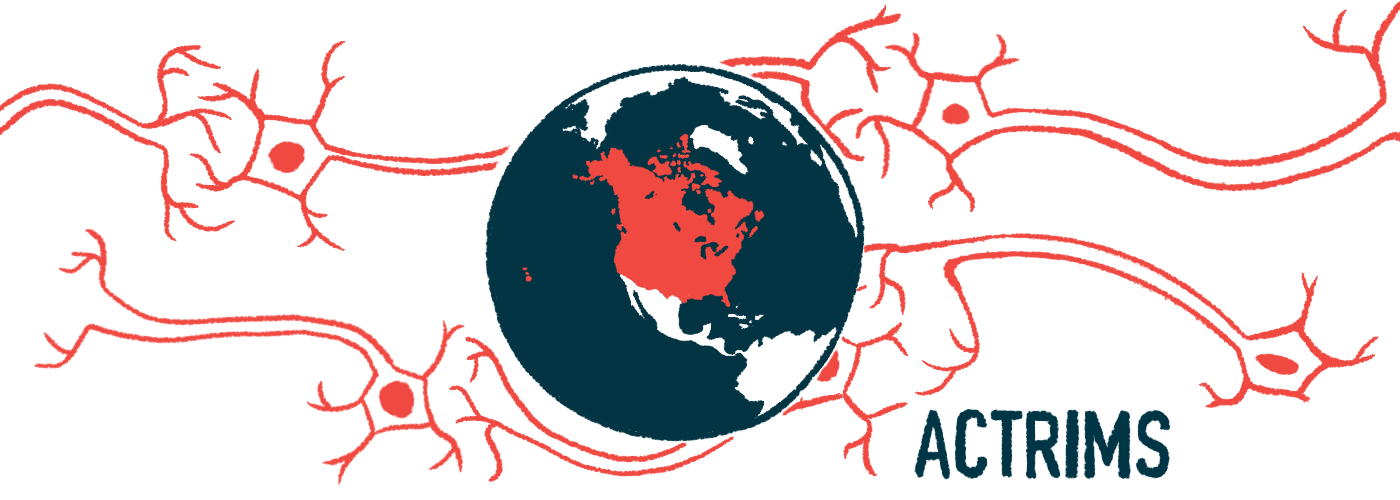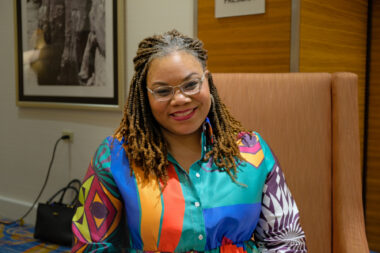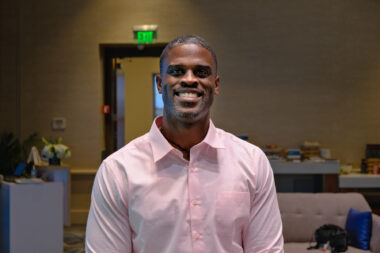ACTRIMS 2023: Documentary offers hope for the Black MS community
MS expert, advocate discuss need for greater visibility and awareness

Multiple sclerosis (MS) has long been considered a disease that mostly affects white women. But in the U.S., the numbers indicate that Black people, particularly Black women, may be more likely to develop the neurodegenerative disease than people of other racial and ethnic backgrounds.
For Black individuals, this misunderstanding can lead to misdiagnoses, gaps in care, underrepresentation in clinical trials, and an overall lack of visibility in the MS community.
“There’s still a need for awareness in the general community … that MS does occur in Black people. I think that’s still a huge unmet need,” Mitzi Joi Williams, MD, a neurologist and MS specialist, said in an interview with Multiple Sclerosis News Today.
The interview took place during last week’s Americas Committee for Treatment and Research in Multiple Sclerosis (ACTRIMS) Forum, held in San Diego, following the Biogen-hosted exclusive in-person premiere of the “MS in Black and African Americans” documentary.
MS prevalence may be higher in Black community
The documentary explores the experiences of Black patients living with MS, highlighting the health inequities they face and ways to address them. It was created as part of Medical Stories, a documentary film series produced for PBS/Public Television by Inventi Media Group and supported in part by Biogen.
In addition to Williams, “MS in Black and African Americans” features nurse practitioner and MS expert Sophia Woodson, as well as Tyler Campbell and Dawn Morgan, two Black MS patients and advocates.
Multiple Sclerosis News Today sat down with Campbell and Williams to discuss the documentary and their hopes for the Black MS community in the coming years.

Mitzi Joi Williams, MD, neurologist and MS specialist, at the ACTRIMS Forum 2023
Multiple sclerosis is a neurodegenerative condition in which inflammatory damage to the brain and spinal cord leads to a variety of symptoms, ranging from numbness and tingling to walking difficulties. Patients also often experience pain and fatigue, and may have vision problems.
The disease’s manifestations overall can be similar for Black and white patients, according to Williams, the founding director of the Joi Life Wellness MS Neurology Center, in Georgia.
But, she noted, Black individuals may be more likely to have vision problems among their first symptoms — to include optic neuritis, which is inflammation in the nerve that relays signals from the eyeballs to the brain.
Black patients also might be more likely to experience multiple types of symptoms at the start of their disease, and seem to experience spinal cord dysfunction, marked by movement issues, earlier on in the disease course than other ethnic groups.
A notable difference between Blacks and whites is the faster disease progression and accumulation of disability seen in Black patients.
“Disease progression can occur twice as fast in the Black population,” Williams said, noting that “people may have to use a walking assistive device up to six years earlier than their white counterparts.”
For Campbell, 36, the first signs of his relapsing-remitting MS emerged at age 21, during his junior year at San Diego State University. On the morning after his last college football game of the season, Campbell woke up and couldn’t get up from his bed.
“Instead of rising to my feet, I fell to the floor, paralysis down the right side of my body,” he said.
He also experienced a neck jerking twitch and slurred speech, but says he was feeling different even before those first symptoms manifested.
“I did not understand that my body was actually giving me hints,” said the football player-turned-inspirational speaker. “I felt lethargic, I felt tired a lot leading up.”
According to Campbell, the two words that best describe that morning are “scared and terrified.” And he wants people who watch the documentary to know that part of his story, “to know that I was no superhuman,” he said.
Campbell says he was lucky to get a diagnosis early. From his first symptoms to undergoing MRIs and spinal taps, and ultimately receiving an MS diagnosis, it was “about a two-week process,” Campbell said. “That is extremely quick.”
But he recognizes this isn’t necessarily the norm for Black patients; because MS is not expected in that population — especially among Black men — missed or delayed diagnoses aren’t uncommon.
Campbell recalled walking into a neurologist’s waiting room with a limp and a neck twitch, and having a woman ask him what he was doing there. That surprised reaction extended into the neurologist’s office, with Campbell noting that “when she saw me, her eyes jumped.”
“Looking from a Black male perspective, I knew that it was an anomaly,” Campbell added. “I knew that this was going to be a very unique case.”
That experience is one major reason for Campbell’s participation in the documentary, which aims to make the Black experience with MS more visible. He says that being diagnosed with MS “as a Black man, it’s a feeling I don’t want others to have to go through.”

Tyler Campbell, MS patient and advocate, at the ACTRIMS Forum 2023
“To feel like you’re alone, that others aren’t diagnosed with this like you are — I don’t ever want another [Black man] to be in that position again,” he added.
Williams also has encountered many non-white patients whose MS symptoms weren’t taken seriously.
“Their doctors didn’t think that they had MS because they were of a different ethnicity,” she said, adding that educating the general community and medical professionals is a critical first step toward closing that diagnostic gap.
That starts with educating doctors at primary care offices or emergency rooms, where the majority of patients are initially seen when their symptoms first emerge. Without the right education, those doctors might “misdiagnose or not direct people to get MRIs,” said Williams, who authored the book, “MS Made Simple: The Essential Guide to Understanding Your Multiple Sclerosis Diagnosis.”
She also believes in the importance of empowering patients to understand the disease and be more involved in their care.
“We want people with MS to know … they are their own best advocate,” Williams said.
Black patients have more barriers to care
The documentary highlights that racial inequities in MS extend beyond the diagnosis. According to Williams, other common barriers faced by non-white patients include poor access to care and lack of knowledge about available resources that could help alleviate the financial burden of the disease, like “funding to help with medications or … with things like MRIs.”
Williams also points to inequities “in terms of advocacy.” She said that “knowing you can advocate for yourself and seek care in other places, second or third opinions if you’re not getting what you need,” is something Black patients may not know they can do.
Clinical trial inclusion is another major barrier to health equity. While many Black people are affected by MS, and Black patients typically have more severe disease, they’ve historically been underrepresented in trials. Most trials that have tested approved MS therapies have been far from matching the actual proportion of Black people with MS in the general population.
But Williams says it’s not about participation, it’s about enrollment.
“When we use the word participation … it kind of puts the onus on the person that they don’t want to participate,” Williams said. “But really, it’s low enrollment.”
According to the neurologist, there are systemic barriers that prevent Black patients from participating in trials. For example, trials may exclude participants with certain coexisting conditions that are more likely to occur in the Black population.
Also, participating in clinical trials comes with a number of costs for patients, from missed days at work to travel expenses. Some potential participants may need child or elder care for family members to allow them to go to trial-related appointments. These underlying costs may pose an extra burden on Black communities and other minority groups, who traditionally face more financial problems due to the racial wealth gap.
In addition to overcoming these systemic barriers, Williams believes that the medical community needs to work to build trust in minority communities, so as to become trusted partners when it comes to clinical trials. A history of racism and discrimination in clinical research may make Black patients hesitant to take part.
Campell now tells others that he took part in clinical trials, both in the hope of contributing to increased study participation in the Black community and of building more trust with medical professionals.
“If I don’t tell people about that, if we don’t talk about those things, then other people who are diagnosed in our community won’t know that it’s okay to try to trust [the medical community and] feel like they can sign up for a clinical trial,” he said, adding, “The healthcare system is not what it once was.”
Williams also said patients need to know about the scientific benefits of clinical trials and the “safeguards that are in place to prevent people being abused.” She notes a need to “renovate” the approach to clinical trial design. That means including patient input in trial design and educating colleagues about the importance of diversity in clinical research.
Advocacy is key to promote change
For Williams and Campbell, visibility and advocacy both emerged as major themes of the documentary — and as critical pathways for closing care gaps for Black patients.
Campbell is an active advocate in the MS community, serving as an ambassador for the National Multiple Sclerosis Society and giving inspirational talks to others with the disease. He also launched the Educate. Elevate. Collaborate. initiative, which works to boost MS outreach, awareness, and engagement in underserved communities.
These efforts, in addition to his participation in the documentary, aim to let other MS patients of color know they aren’t the only ones living through these experiences.
“When you create visibility, it allows people to not feel alone,” Campbell said.
He believes that “a documentary like this is creating conversations all across the country about what it’s like to be diagnosed with MS as a Black person.” But he says “it’s not enough to hear our cries. It’s not enough to hear about equity issues … We now have to move toward action.”
Campbell hopes these efforts will play an important role in changing the MS experience for Black patients. When asked about the changes he hopes to see for the Black community in the next 10 years, he said, “When you walk into an office, let’s see some pamphlets that look like us.”
When that type of representation exists, “it brings forth the opportunity in the next couple of years that MS is a part of our discussion within our community … like diabetes is, like sickle cell, like high blood pressure, like high cholesterol,” he added.
In 10 years, that could mean “MS is not so much of this outlandish thing that we’ve never heard of,” Campbell said. It also could mean earlier diagnoses for Black patients, and seeing people living with MS and still “doing everything that they’ve always wanted to do” because they received treatments much earlier in the disease course.
As a healthcare professional, Williams hopes the next 10 years will see “the creation of communities of support” for Black patients. She also wants to see clinical trials with “adequate numbers of enrollment from the beginning, where we don’t have to do another study on the back end to explore these populations.”
In addition, there should be much more data in the future to understand “how many [Black] people are living with this disease and … ways to directly impact and improve healthcare outcomes,” she said.
Williams believes there are plenty of reasons to be optimistic about closing care gaps for Black patients.
“I’m excited about many things,” she said. Those include the National African Americans with MS Registry and the Phase 4 CHIMES trial (NCT04377555), which is investigating treatment responses to Ocrevus (ocrelizumab) in Black and Hispanic MS patients. Williams is the lead investigator of that trial.
“We certainly have a long way to go, but we’ve come a very long way,” Williams said.
“When you have hope, you have everything”
As for take-home messages from the documentary, Williams “would love for people to feel seen, to know that they are not alone, and to see people talk about their experiences with MS and how, even though they may have had to pivot and shift some of their goals, they’re still living well and thriving.”
For Campbell, however, it’s more than just creating visibility — it’s a call to action.
“No more sitting on our hands. We’ve talked about this enough. Now we’ve got to do something about it. Be a part of the change,” he said.
“It’s not enough that Tyler gets it right. Tyler gets the care. Tyler’s doing okay. Tyler has a family,” he added. “We’re on stage saying, ‘Well, not only is this opportunity being presented to us, but the door is being held open for you to take this thing further than you could have ever imagined in our community.'”
Both Williams and Campbell agree that hope is another major takeaway.
“I hope that people will hold the word ‘hope’ near and dear to their heart. I hope that people see the needle moving forward,” Campbell said.
“When you have hope, you have everything,” he added. “If you can just have hope and love, you’re on the recipe to creating a new you with the disease that you live with. …. You are unstoppable … And best part about it is, those things are free.”
The documentary, “MS in Black and African Americans,” is scheduled to air on local PBS stations; please check local listings. It is also available online the Biogen-sponsored website AboveMS.com.
Note: The Multiple Sclerosis News Today team is providing in-depth coverage of the ACTRIMS Forum 2023 Feb. 23–25. Go here to see the latest stories from the conference. Follow along on Facebook, Twitter, and Instagram for live updates using the hashtag #actrims2023.










